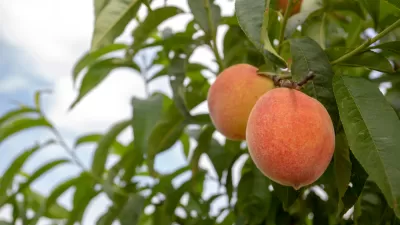An article by Colleen Fuller highlights collaborative initiatives in Maine's food system as well as key challenges the state faces in reaching a goal of increasing and broadening access to, and consumption of, local food.
Maine is investing more in local agriculture and is taking steps to return to a time when Maine was the "bread basket of the Northeast" and the majority of food consumed in Maine was produced in Maine. States interested in promoting local foods as part of larger planning efforts can learn from the successful collaborative approaches activating interest in Maine's food system.
Collaborative initiatives in Maine's food system include:
- Local Food Councils. Spearheaded by the Maine Network of Community Food Councils, local councils across the state apply a systems approach to supporting and strengthening food production and access. Efforts include the Maine Food Atlas, an asset mapping tool focused on food.
- Maine Food Strategy. This initiative is convening a statewide participatory process that will identify and advance shared goals to support a robust food economy in our state.
- Maine Local Foods Access Network (MLFAN), a group of Maine nonprofits collaborating to improve low-income access to locally grown foods across the state. Activities include Maine Harvest Bucks, where SNAP shoppers receive bonus local fruits and vegetables, stretching limited benefits much further.
- Maine's Farm and Fish to School. This network knits together a wide diversity of students, teachers, school nutritionists, parents, farmers and groups who support child nutrition and Maine agriculture.
- Maine Farm & Sea Cooperative, a procurement and food service management company that provides Maine institutions with the highest possible percentage of locally produced, value-added food.
Despite Maine's growing food revolution, there are challenges to promoting local food, such as the lack of processing facilities and poor infrastructure.
Planners can support local food initiatives by having strong, clear ordinances that prevent conflict between producers and their neighbors, such as local ordinances that strengthen state right-to-farm rules and allow farm stands and farmers' markets.
FULL STORY: Maine’s Road to a Food Revolution

Maui's Vacation Rental Debate Turns Ugly
Verbal attacks, misinformation campaigns and fistfights plague a high-stakes debate to convert thousands of vacation rentals into long-term housing.

Planetizen Federal Action Tracker
A weekly monitor of how Trump’s orders and actions are impacting planners and planning in America.

San Francisco Suspends Traffic Calming Amidst Record Deaths
Citing “a challenging fiscal landscape,” the city will cease the program on the heels of 42 traffic deaths, including 24 pedestrians.

Defunct Pittsburgh Power Plant to Become Residential Tower
A decommissioned steam heat plant will be redeveloped into almost 100 affordable housing units.

Trump Prompts Restructuring of Transportation Research Board in “Unprecedented Overreach”
The TRB has eliminated more than half of its committees including those focused on climate, equity, and cities.

Amtrak Rolls Out New Orleans to Alabama “Mardi Gras” Train
The new service will operate morning and evening departures between Mobile and New Orleans.
Urban Design for Planners 1: Software Tools
This six-course series explores essential urban design concepts using open source software and equips planners with the tools they need to participate fully in the urban design process.
Planning for Universal Design
Learn the tools for implementing Universal Design in planning regulations.
Heyer Gruel & Associates PA
JM Goldson LLC
Custer County Colorado
City of Camden Redevelopment Agency
City of Astoria
Transportation Research & Education Center (TREC) at Portland State University
Jefferson Parish Government
Camden Redevelopment Agency
City of Claremont



























